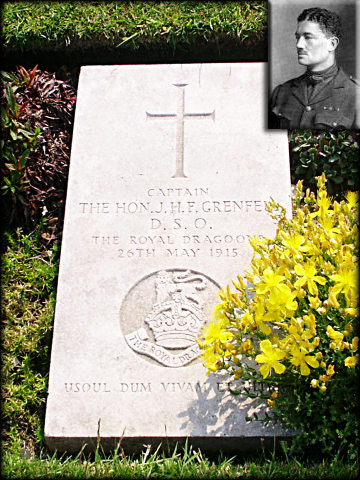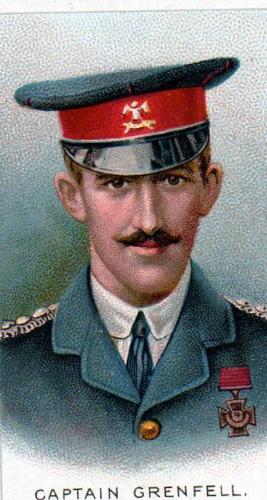Julian Grenfell
(1888-1915)
Gave the verbal message in person to A Squadron, Leicestershire
(PAO) Yeomanry, to "Hold on
at all costs" from 6th Cavalry Brigade HQ.

Captain J H F Grenfell
1st (Royal) Dragoons
Julian Grenfell, the eldest son of William
Henry Grenfell and Ettie Grenfell, later Lord and Lady
Desborough, was born in London, England. The family home was
Taplow Court, Buckinghamshire. Julian’s father, a celebrated
sportsman and his mother, a renowned society hostess, were
members of ‘the Souls’, a group of influential artistic and
intellectual aristocrats.
From childhood, Julian drew and wrote poems. He had a
deeply-felt response to nature and loved outdoor pursuits, his
dogs and horses. At Eton he won the Jelf prize for Latin verse
and wrote for and edited college magazines. Efforts by his
mother to involve him in her social world resulted in a
rebellious early poem, 'I Won't be Made a Social Pet!' At Oxford
he was regarded as a ‘golden boy’ who ‘did everything and shone
in them all. He rowed, and he hunted, and he read and he roared
with laughter, and he cracked his whip in the quad all night; he
bought greyhounds from the miller of Hambleden, boxed all the
local champions; capped poetry with the most precious of the
dons and charmed everybody . . . 'the only things he couldn’t
stand were pose or affectation’ (Lawrence Jones).
Grenfell wrote a series of essays criticizing what he felt
were the contradictions of contemporary society. Overwork,
illness and disappointment in his romantic affairs, coupled with
rejection of his ideas, led to a breakdown, with the result that
he received only a pass degree.
After Oxford, in 1910, Grenfell joined the Royal Dragoons, a
heavy cavalry regiment. At first stationed in India and then
South Africa, he continued to draw and to write - poems, comical
plays for his men to perform and articles for the regimental
magazine. A poem from this time, 'To a Black Greyhound',
expresses the close affinity he felt with animals. He read the
work of Rupert Brooke, which he loved. He toyed with the idea of
becoming an artist, but his family did not encourage his
ambitions. By the summer of 1914, he was on the point of leaving
the army. However, war was declared on 4th August and by early
October, Grenfell was in France. He loved the outdoor life, the
companionship of horses, dogs and men and the opportunity to
throw himself into the fight for a noble cause. He gained a
reputation for light-hearted courage and won the DSO. He was
mentioned in dispatches and promoted to the rank of Captain. He
refused a job as ADC, saying his regiment was short of officers
and wrote a satirical poem, ‘Prayer for Those on the Staff’.
Grenfell’s best-known poem, ‘Into Battle’, was written at a time
of confusion as he and his men waited to go up to the front near
Ypres. It expresses his long-felt, almost mystical connection
with the natural world and the fighting man’s place within it.
On 13th May 1915, Grenfell was wounded by
a shell-splinter to the head while monitoring enemy troop
movements. He died on 26th May with his parents and his
sister Monica, a Red Cross nurse, at his bedside. ‘Into Battle’
was published in ‘The Times’ together with the announcement of
his death.
The poem was an inspiration to many in its own day and has been
much anthologised since. Had he lived, Grenfell’s outlook and
his poetry may have changed as disillusion and anger were
engendered by protracted trench warfare and needless mass
slaughter.
Taplow Court, Grenfell's home, is now owned by SGI-UK, a lay
Buddhist society whose activities aim to contribute to a more
just and peaceful world. The house and grounds are open to the
public at advertised times during the Summer and to groups
throughout the year by appointment. A Julian Grenfell exhibition
and series of related events were staged at Taplow Court during
2005, to mark the connections with the soldier-poet and his
family and 90th anniversary of Julian's death.
INTO BATTLE
The naked earth is warm with spring,
And with green grass and bursting trees
Leans to the sun’s gaze glorying,
And quivers in the sunny breeze;
And life is colour and warmth and light,
And a striving evermore for these;
And he is dead who will not fight;
And who dies fighting has increase.
The fighting man shall from the sun
Take warmth, and life from the glowing earth;
Speed with the light-foot winds to run,
And with the trees to newer birth;
And find, when fighting shall be done,
Great rest and fullness after dearth.
All the bright company of Heaven
Hold him in their high comradeship,
The Dog-Star, and the Sisters Seven,
Orion’s Belt and sworded hip.
The woodland trees that stand together,
They stand to him each one a friend;
They gently speak in the windy weather;
They guide to valley and ridge’s end.
The kestrel hovering by day,
And the little owls that call by night,
Bid him be swift and keen as they,
As keen of ear, as swift of sight.
The blackbird sings to him, ‘Brother, brother,
If this be the last song you shall sing,
Sing well, for you may not sing another;
Brother, sing.’
In dreary, doubtful, waiting hours,
Before the brazen frenzy starts,
The horses show him nobler powers;
O patient eyes, courageous hearts!
And when the burning moment breaks,
And all things else are out of mind,
And only Joy of Battle takes
Him by the throat, and makes him blind,
Through joy and blindness he shall know,
Not caring much to know, that still
Nor lead nor steel shall reach him, so
That it be not the Destined Will.
The thundering line of battle stands,
And in the air Death moan and sings;
But Day shall clasp him with strong hands,
And Night shall fold him in soft wings.
Julian's Brother :-

Francis Octavius Grenfell VC
(4 September 1880 - 24 May 1915) was an English recipient of
the Victoria Cross, the highest and most prestigious award for
gallantry in the face of the enemy that can be awarded to
British and Commonwealth forces
Grenfell
Family
An Etonian who represented his school at cricket, Grenfell
joined the army in 1900 and first served in the Second Boer War
in the King's Royal Rifle Corps. Francis and his twin brother,
Riversdale (also in the 9th Lancers and was killed in action in
September 1914), were the youngest of fifteen children born to
Pascoe Du Pré Grenfell and Sophia (née Grenfell).
The Grenfell twins were from a notable military family. Their
maternal grandfather was Admiral John Pascoe Grenfell and other
relatives included their uncle, Field Marshall Francis Grenfell,
1st Baron Grenfell. An older brother, Lieutenant Robert Septimus
Grenfell,
21st Lancers, was killed in a cavalry charge during the
Battle of Omdurman in 1898. Three
other brothers (Cecil Alfred, Howard Maxwell and Arthur Morton
Grenfell) all reached the rank of Lieutenant Colonel in the
British Army. A cousin, Lieutenant Claude George Grenfell
(Thorneycroft's Mounted Infantry) was killed at Spion Kop during
the Boer War and two other cousins Julian Grenfell, the poet,
and his brother, Gerald William Grenfell, were killed in the
First World War.[
He was 33 years old, and a Captain in the 9th Lancers,
British Army during the First World War when the following deed
took place for which he was awarded the VC.
On 24 August 1914 at Audregnies, Belgium, Captain Grenfell
rode with the regiment in a charge against a large body of
unbroken German infantry. The casualties were very heavy and the
captain was left as the senior officer. He was rallying part of
the regiment behind a railway embankment when he was twice hit
and severely wounded. In spite of his injuries, however, when
asked for help in saving the guns, by the commander (Ernest
Wright Alexander) of the 119th Battery, Royal Field Artillery,
he and some volunteers, under a hail of bullets, helped to
manhandle and push the guns out of range of enemy fire. The
citation was gazetted on 16 September 1914.
He was killed in action on 24 May 1915 and is buried in the
Vlamertinghe Military Cemetery.
His Victoria Cross is displayed at the
Regimental Museum of the 9th/12th Royal
Lancers (The Strand, Derby, England).

